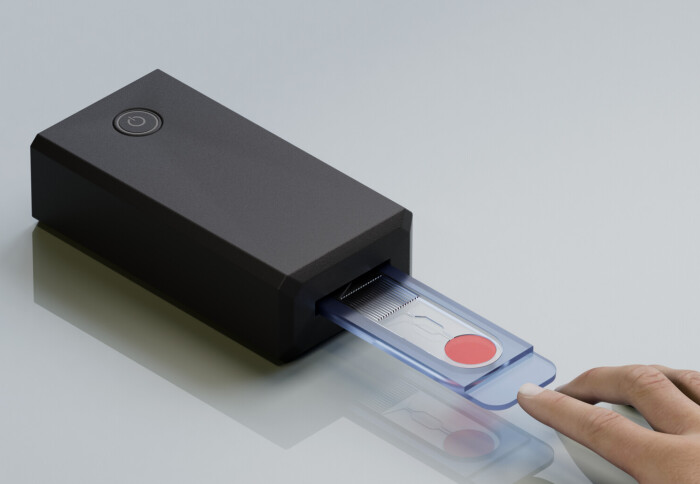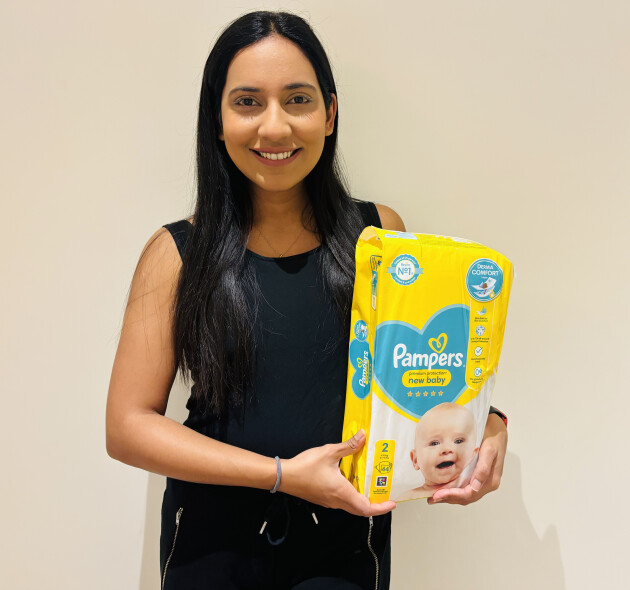BOOST Student Interviews

Beyond Blood
Join us for a conversation with Yu Cheng, a key member of the Beyond Blood team, and Shradda Vadodaria who created Nappinator, winners of BOOST 2022!
What is The BOOST programme? It is an entrepreneurial mentoring scheme offered by the Institute of Chemical Biology CDT. It is open to individuals or small teams with innovative tech ideas or startups they wish to develop further. This can range from a first prototype or proof of concept to a Minimum Viable Product.
Conducted in partnership with the Advanced Hackspace, the programme provides participants with access to the necessary tools and resources to build and refine their ideas. Additionally, participants receive a grant of up to £2000 for consumables.
BOOST offers students the opportunity to explore ideas outside the scope of their PhD research, gaining valuable skills and experience in the process. While we encourage participants to draft an initial six-month plan, the timeline is flexible to ensure it does not interfere with their primary research commitments.
Participants will benefit from various experiences, including design and prototyping, access to an extensive network, the practice of effectively communicating their ideas, and the freedom to explore new concepts.
This has been reported on by the ICB CDT Social Media Committee.
The Beyond Blood team marked the beginning of their ambitious journey to develop a portable cell counter with disposable microfluidic cartridges and a Bluetooth-connected neutrophil count reader.
What initially sparked your interest in pursuing a project outside your PhD research through the Boost Programme? One member of our team, Manfredi, was planning to launch a start-up company focusing on blood cell count. The Boost call was timely, as I was interested in trying something different outside my PhD project. So, we decided to apply with the “Beyond Blood” project together.
What has inspired you to come up with your BOOST project idea? Both Manfredi and I have some research experience in microfluidics. We read some papers about on-chip cell sorting and cell counting which inspired the idea of developing a portable cell counter that uses disposable microfluidic cartridges and a Bluetooth-connected neutrophils count reader.
How did the freedom to explore ideas outside your field help you grow as a student? I have been deeply encouraged to pursue my own ideas.
How has the Boost grant helped getting started with the project? The boost grant enabled us to order some hardware and consumables to conduct an initial experimental demo.
How was your journey with BOOST and how did it help you in enhancing your design and prototyping experience? We all know that, sometimes, it is a long and tough journey from your practical experiments to published results. And of course, it is even harder to develop a device which is really useful for customers. But this process taught us to think about problems from various angles: researcher, manufacturer, customer and investor, which is the most valuable lesson I learned during this process.
What were some of the key milestones or achievements you accomplished during your Boost project? In 2022, Manfredi formally launched his start-up: Beyond Blood; to carry on the development and commercialization of our idea.
How do you envision your BOOST project evolving in the future perhaps in the next 5 years? Beyond Blood is a seed-stage spin out from Imperial College London, developing more cell sorting and detection technologies. I hope that our idea can eventually help cancer patients and become a success.
What are the potential real-world applications of your project? Neutrophils are the main clinical marker in evaluating chemotherapeutic toxicity in cancer patients. We wish to enable rapid finger prick tests that can be done at home, that will help to reduce the number of hospital appointments patients need to attend, along with the physical and mental anxiety they suffer while waiting for the results.
What advice would you give to future ICB CDT students considering applying for the Boost Programme? It is always good to think through big ideas and try something difficult in a supportive environment. If I had any advice to future BOOST applicants, it would be start by researching what exists and make adaptations until you achieve your goal.
Having made the leap myself, I totally understand that it is scary stuff to push yourself out of your comfort zone, but the benefits on the other side make it worth it. Shradda Vadodaria, Nappinator

Nappinator, on the other hand, offers a contemporary, eco-friendly solution to diaper disposal issues.
What initially sparked your interest in pursuing a project outside your PhD research through the Boost Programme? And what has inspired you to come up with your BOOST project idea? I was keen to enrich my PhD studies with experiences that would enhance my independent learning and kickstart my entrepreneurial ambitions. Combing my scientistic aptitude with my love for product innovation has pushed me way out of my comfort zone and enabled me to appreciate the synchrony of the two mindsets. At first I was very hesitant to start another project in the background of my PhD project, which is always ongoing and intensifies with time. But once I gained a solid foundation in my PhD work, it became easier to allocate more time to my BOOST project and every time I “switch mode” I learn something I can apply to my growth as a researcher.
My Nappinator idea pre-existed my BOOST chapter. After witnessing my sister’s journey with diaper changing (and participating as per Aunty duties), I was stunned by the sheer amounts of non-compostable plastic disposed after five nappy changes a day. While discussions for single-use plastics tend to be dominated by plastic straws and bags, disposable diapers contribute significantly to plastic waste, with 250 million diapers used daily globally. Determined to integrate diaper disposal into the sustainable circular economy, I was motivated to create a state-of-the-art diaper disposal system. I envision that the Nappinator incorporates a novel mechanism and a chemical solution that enables rapid biodegradation of compostable and biodegradable nappies.
How did the freedom to explore ideas outside your field help you grow as a student? It provided me with the confidence to approach problems with higher self-autonomy and to be okay with huge learning curves.
How has the Boost grant helped getting start with the project? Initial seed funding from the BOOST scheme, coupled to a highly collaborative environment at the Advanced Hackspace, has kickstarted the development of the first prototype. Although many rounds of optimization are still required, I have a newfound addiction to “hacking” (and 3D printers!) and admire the highly rewarding journey of product development. A large pillar of the initial stages of the project also involved scientific research of engineering concepts that were quite alien to a chemist like me. From the fluid mechanics of the chemical degrader to the electromechanical architecture of a propellor- the learning curve remains steep yet highly rewarding.
Can you describe the design and prototyping experience you gained through your journey with BOOST? M y current goal is to craft a minimum viable product (MVP) that can be brought to the early market, thus promoting an efficient design cycle. After a rather long hiatus, I am excited to make and break again at the hackspace with new collaborators from the Imperial Engineering School. Also BOOST gives you full access to the Advances Hackspace at White City which is a collaborative space to hack and product design. I have met some awesome people there who are also turning their ideas into realities. I admire how they approach prototyping without hesitation whereas personally this was the biggest hurdle for me as I went in thinking “I am no engineer.” This mindset was totally wrong and limiting. You certainly don’t have to be an engineer to have fun with machines.
What were some of the key milestones or achievements you accomplished during your Boost project? Integrating into the Advanced Hackspace, learning to 3D- print and working on my first prototype.
What do you think set your idea apart from the others? To my knowledge, this system does not exist on the market, possibly owing to a high manufacturing cost. But as we gain more climate consciousness as a society, I believe there will be a demand for products like the Nappinator.
How do you envision your BOOST project evolving in the future e.g. in 5 years? I hope to take the product through a few rounds of prototyping and would love to form a company around the Nappinator. I am still really excited to explore scientific research however, so I may be at a crossroads in the future where I need to decide whether or not to pursue my own company. Nonetheless, if I decide not to, BOOST has been such an excellent introduction to the game of product design and I’m excited to apply these teachings to other personal projects.
What are the potential real-world applications of your project? Ultimately my mission is to completely revolutionise current nappy disposal systems by integrating them into our current water systems. It suggests drastic change and comes with a learning curve to both consumers (parents) and manufacturers of both bins and nappies. However I strongly believe it is necessary to “drastically change” the system to produce an outcome that is even slightly impactable on the current plastic waste disaster. Such IP can have broad applications outside this market and can be applied to other flushable wipes, adult diapers etc… but baby steps first!
What advice would you give to future ICB CDT students considering applying for the Boost Programme? Go for it! If you have an idea and require material and resources that can be costly and inaccessible to make it come to life, then BOOST is for you. If you have an idea and want to take it to a prototyping stage, the Advanced Hackspace is literally at your doorstep through BOOST and it’s such an incredible place to bring your vision to the 3D printer! Having made the leap myself, I totally understand that it is scary stuff to push yourself out of your comfort zone but the benefits on the other side make it worth it. The benefits for me have been personal growth as a collaborative researcher and aspiring entrepreneur.
Article text (excluding photos or graphics) © Imperial College London.
Photos and graphics subject to third party copyright used with permission or © Imperial College London.
Reporter
Press Office
Communications and Public Affairs
- Email: press.office@imperial.ac.uk
